高一上人教版英语必修1学案Unit2 English around the world学案语言运用导学案
人教版高中英语必修1《Unit 2 English around the world》教案
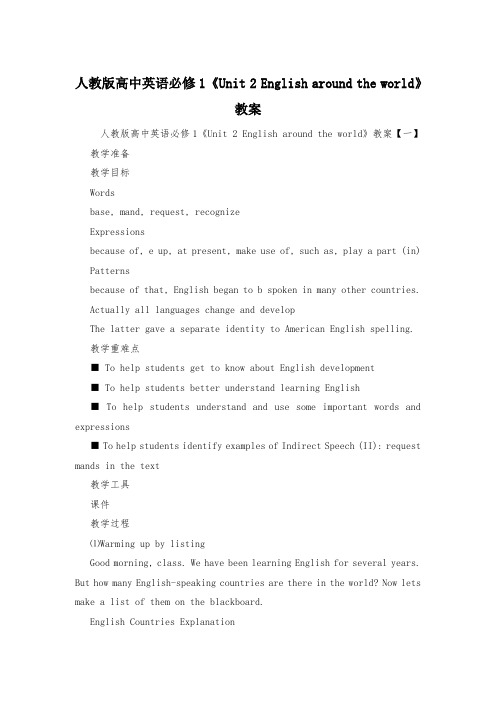
人教版高中英语必修1《Unit 2 English around the world》教案人教版高中英语必修1《Unit 2 English around the world》教案【一】教学准备教学目标Wordsbase, mand, request, recognizeExpressionsbecause of, e up, at present, make use of, such as, play a part (in) Patternsbecause of that, English began to b spoken in many other countries. Actually all languages change and developThe latter gave a separate identity to American English spelling.教学重难点■ To help students get to know about English development■ To help students better understand learning English■ To help students understand and use some important words and expressions■ To help students identify examples of Indirect Speech (II): request mands in the text教学工具课件教学过程⑴Warming up by listingGood morning, class. We have been learning English for several years. But how many English-speaking countries are there in the world? Now lets make a list of them on the blackboard.English Countries ExplanationMother tongue the United Kingdomthe United States of AmericaCanadaAustraliaSouth AfricaIrelandNew Zealand The people in these countries are native speakers of English. In total, for more than 375 million people English is their mother tongue.Second language IndiaPakistanNigeriathe Philippines These people speak the language of their own country at home but the language of the government, schools, newspapers, and TV is English.Foreign language ChinaGermanyFranceetc. The number of people who learn English as a foreign language is more than 750 million.⑵Warming up by answering questions about EnglishGood morning, class. Today we shall start learning Unit 2 English around the world. But how much do you know about English?●What is Standard English?Standard English is the form of English that most people in Britain use, and that is not limited to one area or group of people.●What is a dialect?A dialect is a variety of a language spoken only in one area, in which words, or grammar are slightly different from other forms of the samelanguage.●Do we have standard Chinese? What is it?In China therere so many dialects that the government encourages the whole nation to speak Putonghua, which is regarded as standard Chinese.⑶Warming up by giving reasonsUnit 2 English around the world is what we are going to learn today. We are all learning English now because English is so popular in the world. But do you know why it is so? How many reasons could you giving for the spread of English around the world?* English is one of the official languages of the Olympic Games and the United Nations.* English dominates international websites and provides nearly all of the new puter terminology.* Tourism and trade from Western Europe and North America has contributed to the spread of English.* Satellite TV, radio programs like Joy FM, CDs and, of course, Hollywood films all broadcast English into China. Also, a number of Chinese films include English subtitles.-readingWe are learning English here. But why are we learning it? Could you suggest to the class as many reasons as you can think of, why people in the world learn English?for work, as a hobby, to learn about other people, to travel, to read literature in the original, to read research papers, to meet foreigners, to surf the Internet, to pass exams, etc.Go on with your reasons. I shall write your suggestions on the board as you make them.3. Skimming the text for general ideasNow we go to page 9 to skim the text for the main idea of each paragraph.Paragraph 1: The spread of the English language in the worldParagraph 2: Native speaker can understand each other even if they dont speak the same kind of English.Paragraph 3: English changes and develops when cultures meet and municate with each other.Paragraph 4: By the 19th century English is settled.Paragraph 5: English is spoken as a foreign language or second language in South Asia.4. Reading and fillingRead the text to plete the chart below.Time English is influenced byAD 450-1150 German1150-1500 FrenchIn the 1600s Shakespeare, who make use of a wider vocabulary than ever beforeBy the 19th century Samuel Johnson, Noah WebsterNow Languages in South Asia, in Singapore, in Malaysia, in Africa and in China5. Reading and copyingNext we shall go over the text once more. This time try find and copy all the useful expressions down in your notebook.Useful expressionsat the end of, make voyages, speak English as, in the next century, change over time, municate with, be based on, at present, bee less like, rule England, enrich the English language, make use of, move to, later in the 18th century, give a separate identity to, have a very large number of, fluent English speakers, bee the language for, develop ones own identity, increase rapidly人教版高中英语必修1《Unit 2 English around the world》教案【二】教学准备教学目标Teaching aims:1) Get the students to master some important words, phrases and sentence patterns.2) Enable the students to use the language points by themselves.教学重难点Teaching important points:Master the usages of more than , e up, over, be based on, present, a/ the number ofTeaching difficult points:present: v adj教学工具课件教学过程1 Do you know that there is more than one kind of English?more than one 不止一个eg:More than one girl in this school holds such a view.more than one 后跟___________,作主语时,谓语动词要用______。
高中英语人教版必修1 Unit2-English around the world 完整学案
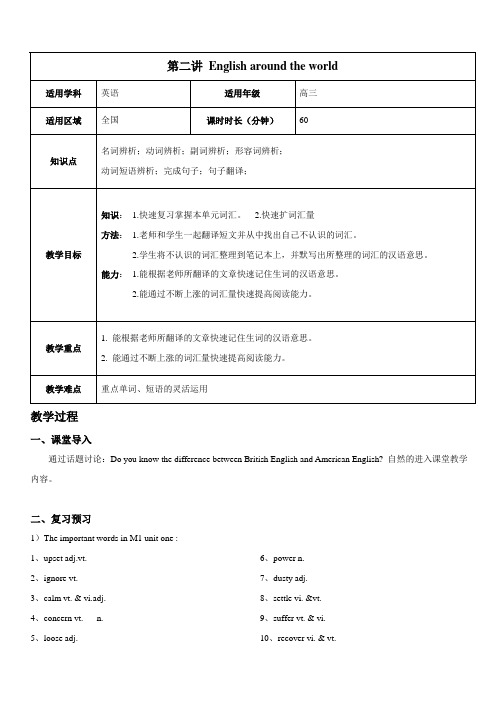
第二讲English around the world 适用学科英语适用年级高三适用区域全国课时时长(分钟)60知识点名词辨析;动词辨析;副词辨析;形容词辨析;动词短语辨析;完成句子;句子翻译;教学目标知识: 1.快速复习掌握本单元词汇。
2.快速扩词汇量方法: 1.老师和学生一起翻译短文并从中找出自己不认识的词汇。
2.学生将不认识的词汇整理到笔记本上,并默写出所整理的词汇的汉语意思。
能力: 1.能根据老师所翻译的文章快速记住生词的汉语意思。
2.能通过不断上涨的词汇量快速提高阅读能力。
教学重点1. 能根据老师所翻译的文章快速记住生词的汉语意思。
2. 能通过不断上涨的词汇量快速提高阅读能力。
教学难点重点单词、短语的灵活运用教学过程一、课堂导入通过话题讨论:Do you know the difference between British English and American English? 自然的进入课堂教学内容。
二、复习预习1)The important words in M1 unit one :1、upset adj.vt. ________2、ignore vt. __________3、calm vt. & vi.adj. ____4、concern vt. n. _____5、loose adj. _________6、power n. __________7、dusty adj. _________8、settle vi. &vt. ______9、suffer vt. & vi. __________10、recover vi. & vt. ________2)The important phrases in this passage:1.add up_____________________2.calm down_________________3. be concerned about__________4. go through_________________5. set down___________________6. a series of____________________7. on purpose___________________8. in order to ___________________9. suffer from __________________10.be tired of ___________________三、知识讲解翻译下面由本单元词汇所编成的故事要求学生在翻译过程中不会的词汇用横线标出(一)The passageDifferent Countries Have Different Kinds of EnglishVoyages of people from England play an important part in spreading the English language. At present,English is frequently spoken as an official or common language in many countries, such as America,Singapore, Malaysia and some African countries. All based on British English, the English spoken in these countries can be well understood by native English speakers. But actually, these English have been gradually changing in accents, spellings, expressions and the usage of vocabulary.Because of this fact, you can make use of the differences to tell which country the foreigners of your block are from. For example, if a boss fluently commands his driver, “Come up straight to my apartment byElevator and take some gas for my trucks and cabs”, instead of request ing, “P lease come to my flat by lift and take some petrol for my lorries and taxis”, you can recognize his American identity, while the latter suggests that he is British.逐句翻译原文:______________________________________________________________________________________________ ___________________________________________________________________________________________________ ___________________________________________________________________________________________________ ___________________________________________________________________________________________________ ___________________________________________________________________________________________________ ___________________________________________________________________________________________________ ___________________________________________________________________________________________________ ______________________________________________________________________________________________________________________________________________________________________________________________________ ___________________________________________________________________________________________________(二)重点知识总结与解析:The important word in this passage:1、native adj. n. __________2、apartment n. __________3、actually adv. __________4、base vt. ______________5、gradually adv. _________6、vocabulary n. __________7、latter adj. _____________8、fluent adj. _______________ 9、frequent adj. _____________10、command n.& vt. ________11、request n. & vt. __________12、expression n. ___________13、recognize vt. ____________14、accent n. _______________15、straight adv. adj. __________The important phrases in this passage:1、because of __________2、come up ___________3、at present __________4、make use of ____________5、such as ________________6、play a part (in) __________(三)知识点讲解:重点词汇知识点1 base vt.以……为根据n.基部;基地;基础[教材原句]It was based more on German than the English we speak at present.(P10) 比起现在我们说的(英语)它更大程度上是以德语为基础的。
高一上人教版英语必修1学案Unit2 English around the world学案语言运用导学案2

Unit 2 of Book I English around the world (learning about language and Using language)语言运用导学案编写人:审核人:审批人:【使用说明及学法指导】1、20分钟理解并熟记基本有法,建立每个词条的知识树。
2、10分钟合作探究,联系生活实际灵活运用所学知识。
3、5分钟成果展示点评课内探究案的内容。
4、5分钟巩固落实、当堂检测。
【学习目标】1、扎实掌握3个单词、1个短语和2个句型的用法,提高语言运用的能力。
2、通过自主学习和合作探究,学会归纳总结的方法。
3、激情投入,高效参与课堂,体验用英语表达情感的快乐。
【自学导引】课前自主学习Ⅰ.单词识记Ⅰ.单词预知1.v. 命令;掌握;请求,要求;辨认出;承认;公认2.n. 使用,用法;方言;词语;表达;卡车;口音;闪电;街区;木块;出租车3. adj. 中西部的;东方的;东南方的;西北方的;直的Ⅱ.短语天地1.官方语言2.作航海旅行3.与……交流4.利用5.许多6.……的数量7. make sense ___________8. As we know ____________9.扮演一个角色;参与Ⅲ.句型搜索:经典句式1.in the early days of radio,those whoreported the news were expected to speak excellent English.(this)这是因为在早期的收音机时代,对新闻播音员的要求是讲一口极好的英语。
2.However,on TV and the radio you will heardifferences .(way)但是,从电视上和收音机上,你会听到不同的人有着不同的说话方式。
3.So people from the mountains in the southeastern USAspeak with almost dialect people in the northwesternUSA.(as)所以来自美国东南部山区的人和来自美国西北部的人说着同样的地方方言。
人教版课标必修一 Unit 2 English around the World学案
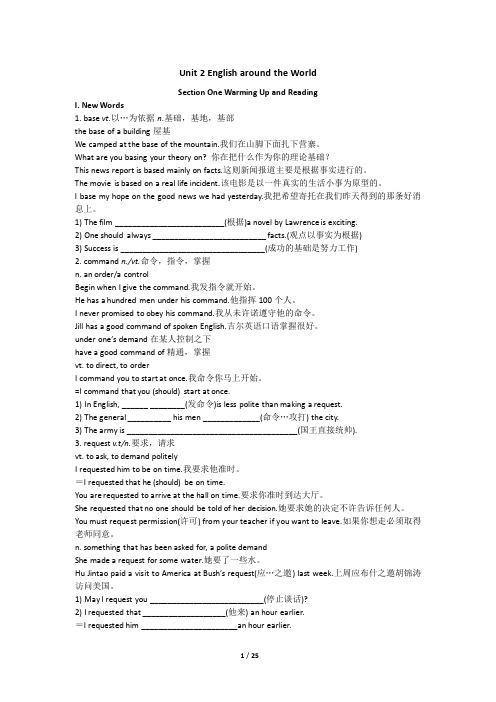
Section One Warming Up and Reading I. New Words 1. base vt. 以…为依据 n. 基础,基地,基部 the base of a building 屋基 We camped at the base of the mountain. 我们在山脚下面扎下营寨。 What are you basing your theory on? 你在把什么作为你的理论基础? This news report is based mainly on facts. 这则新闻报道主要是根据事实进行的。 The movie is based on a real life incident. 该电影是以一件真实的生活小事为原型的。 I base my hope on the good news we had yesterday. 我把希望寄托在我们昨天得到的那条好消 息上。 1) The film _________________________(根据)a novel by Lawrence is exciting. 2) One should always __________________________ facts.(观点以事实为根据) 3) Success is _________________________________(成功的基础是努力工作) 2. command n./vt. 命令,指令,掌握 n. an order/a control Begin when I give the command. 我发指令就开始。 He has a hundred men under his command. 他指挥 100 个人。 I never promised to obey his command. 我从未许诺遵守他的命令。 Jill has a good command of spoken English. 吉尔英语口语掌握很好。 under one’s demand 在某人控制之下 have a good command of 精通,掌握 vt. to direct, to order I command you to start at once. 我命令你马上开始。 =I command that you (should) start at once. 1) In English, ______ ________(发命令)is less polite than making a request. 2) The general __________ his men _____________(命令…攻打) the city. 3) The army is _______________________________________(国王直接统帅). 3. request v.t/n. 要求,请求 vt. to ask, to demand politely I requested him to be on time. 我要求他准时。 =I requested that he (should) be on time. You are requested to arrive at the hall on time. 要求你准时到达大厅。 She requested that no one should be told of her decision. 她要求她的决定不许告诉任何人。 You must request permission(许可 ) from your teacher if you want to leave. 如果你想走必须取得 老师同意。 n. something that has been asked for, a polite demand She made a request for some water. 她要了一些水。 Hu Jintao paid a visit to America at Bush’s request(应…之邀 ) last week. 上周应布什之邀胡锦涛 访问美国。 1) May I request you __________________________(停止谈话)? 2) I requested that ___________________(他来) an hour earlier. =I requested him ______________________an hour earlier.
高一上人教版英语必修1学案Unit2 English around the world学案阅读导学案
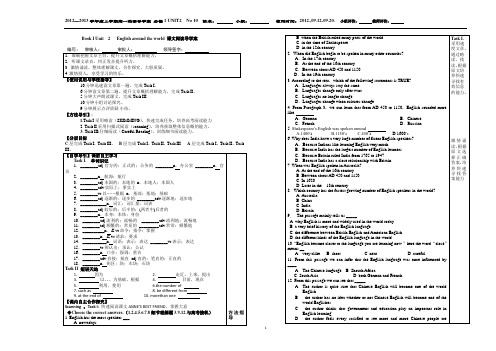
9.________n.本身;本体;身份
10.________adj.流利的;流畅的________adv.流利地;流畅地
11.________adj.频繁的;常见的_________adv.常常;频繁地
12.__________n.& vt.命令;指令;掌握
A.Because Indians like learning English very much.
B.Because India has the largest number of English learners.
C.Because Britain ruled India from 1765 to 1947.
13.________n.& vt.请求;要求
14.___________n.词语;表示;表达________vt.表示;表达
15.________vt.辨认出;承认;公认
16.________n.口音;强调;重音
17.________adv.直接;挺直adj.直的;笔直的;正直的
18.________n.街区;块;木块;石块
◆Choose the correct answers.(1.2.4.5.6.7.8细节理解题3.9-12与高考接轨)
1.English has the most speakers ___.
A. nowadays
B. when the British ruled many parts of the world
C. In 1620.
D. Later in the 18th century.
8.Which country has the fastest growing number of English speakers in the world?
高一英语人教版必修一导学案Unit 2 English around the world Period Ⅱ Reading Comprehension含答案
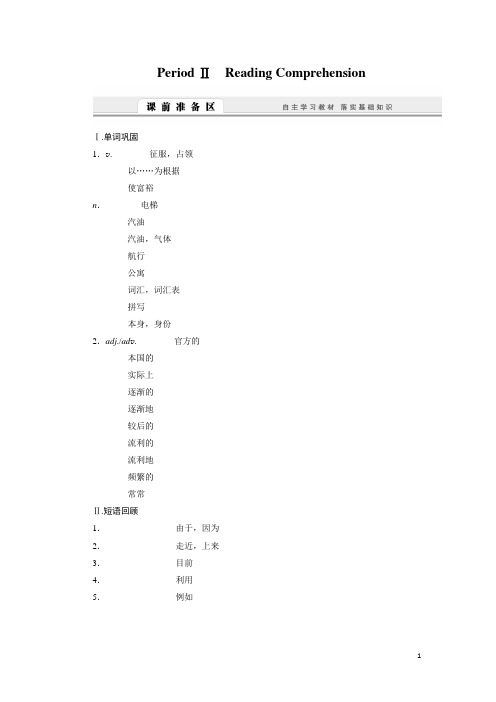
Period ⅡReading ComprehensionⅠ.单词巩固1.v. ________征服,占领________以……为根据________使富裕n.________电梯________汽油________汽油,气体________航行________公寓________词汇,词汇表________拼写________本身,身份2.adj./ad v. ________官方的________本国的________实际上________逐渐的________逐渐地________较后的________流利的________流利地________频繁的________常常Ⅱ.短语回顾1.________________由于,因为2.________________走近,上来3.________________目前4.________________利用5.________________例如Ⅰ.阅读课文,判断正误1.Nearly all of the English-speaking people lived in England at the end of 16th century.()2.In the 17th century,people in many other countries began to speak English as their first,second or a foreign language.()3.Native English speakers usually don’t speak the same kind of English,but they can sometimes understand each other.()4.English spoken in England between about AD 540 and 1150 was different from the English spoken today.()5.At first English was based more on German while the English spoken today is based on Danish and French.()6.The English language wasn’t settled until the 19th century.()7.Noah Webster wrote a dictionary,giving a separate identity to American English spelling.()8.Today English is widely spoken in the world except in South Africa.()Ⅱ.阅读课文,给每段选择正确大意1.Paragraph 1 ()A.Why has English changed over time?2.Paragraph 2 () B.Native English speakers can understand each other even if they don’t speak the same kind of English.3.Paragraph 3 () C.English is now spoken as a foreign or second language in South Asia.4.Paragraph 4 () D.Finally by the 19th century the language was settled.5.Paragraph 5 () E.Many people all over the world speak English.Ⅲ.阅读课文,完成下列表格1.Where did most of the English speakers live at the end of the 16th century?A.America. B.England.C.South Asia. D.South Africa.2.When did English begin to be spoken in many other countries?A.In the 17th century.B.At the end of the 16th century.C.Between about AD 450 and 1150.D.In the 19th century.3.According to the text,which of the following statements is TRUE?A.Languages always stay the same.B.Languages change only after wars.C.Languages no longer change.D.Languages change when cultures change.4.From Paragraph 3,we can learn that from AD 450 to 1150,English sounded more like ______.A.German B.Chinese C.French D.Russian5.Why does India have a very large number of fluent English speakers?A.Because Indians like learning English very much.B.Because India has the largest number of English learners.C.Because Britain ruled India from 1765 to 1947.D.Because India has a close relationship with Britain.Ⅴ.SummaryAs you know,English has changed over time.Why?1.________ all languages change and develop when cultures meet and 2.________ with each other.At first,English was 3.________ more on German than the English we speak 4.____________.Then 5.________ new settlers came and enriched the English language and especially its 6.________.So by the 1600’s Shakespeare was able to 7.____________ a wider vocabulary than ever before.In 1620 some British settlers moved to ter in the 18th century some British people were taken to Australia too.English began to be spoken in both countries.Finally by the 19th century the language was settled.At that time two big changes in English 8.________ happened:first Samuel Johnson wrote his dictionary and later Noah Webster wrote The American Dictionary of the English Language.The 9.________ gave a separate 10.________ to American English spelling.Period ⅡReading Comprehension 课前准备区Ⅰ.1.conquer;base;enrich;elevator;petrol;gas;voyage;apartment;vocabulary;spelling;identity2.official;native;actually;gradual;gradually;latter;fluent;fluently;frequent;frequently Ⅱ.1.because of e up 3.at present4.make use of 5.such as课堂活动区Ⅰ.1.T 2.F 3.F 4.F 5.F 6.T7.T8.FⅡ.1.E 2.B 3.A 4.D 5.CⅢ.1.German 2.ruled 3.less 4.enriched 5.1600’s6.made use ernment10.19th11.dictionary 12.foreignⅣ.1.B 2.A 3.D 4.A 5.CⅤ.1.Actually municate3.based 4.at present 5.gradually6.vocabulary7.make use tter10.identity。
人教版高一英语必修1_Unit2_English_around_the_world_全单元教案
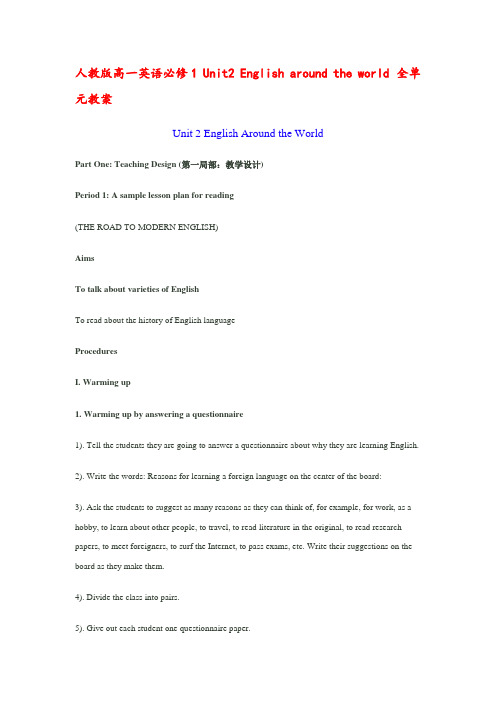
人教版高一英语必修1 Unit2 English around the world 全单元教案Unit 2 English Around the WorldPart One: Teaching Design (第一局部:教学设计)Period 1: A sample lesson plan for reading(THE ROAD TO MODERN ENGLISH)AimsTo talk about varieties of EnglishTo read about the history of English languageProceduresI. Warming up1. Warming up by answering a questionnaire1). Tell the students they are going to answer a questionnaire about why they are learning English.2). Write the words: Reasons for learning a foreign language on the center of the board:3). Ask the students to suggest as many reasons as they can think of, for example, for work, as a hobby, to learn about other people, to travel, to read literature in the original, to read research papers, to meet foreigners, to surf the Internet, to pass exams, etc. Write their suggestions on the board as they make them.4). Divide the class into pairs.5). Give out each student one questionnaire paper.6). Explain the task. The students must question each other about their language learning needs (or motivations). Tell them that you are going to take in the questionnaires at the end, and that you’d like them to make clear notes. It works better if the two partners swap tasks (questions and answers) after each section of the questionnaire. If they wait till the end to swap, one student may use up all the time available.7). When the task is finished, ask a couple of students to summarize their partners’ answers. (This may develop into a class discussion about language needs).8). The students write five sentences on their feeling about learning English.9). Collect the questionnaires.2. Further applyingTo get the students thinking about the topic of the reading passage.1). Have a student list on the board all the English-speaking countries in the world that they can think of.2). Give the students hints about the places they haven’t mentioned.3). Provide the students with an opportunity to think about the reasons for the spread of English around the world.★English is one of the official languages of the Olympic Games and the United Nations.★English dominates international websites and provides nearly all of the new computer terminology.★Tourism and trade from Western Europe and North America has contributed to the spread of English.★Satellite TV, radio programs like Joy FM, CDs and, of course, Hollywood films all broadcast English into China. Also, a number of Chinese films include English subtitles.II. Reading1. SkimmingRead quickly to get the main idea of the text.Let the students find out key sentence of each paragraph or ask them to summarize the main point for each paragraph in their own words.2. ScanningRead to locate particular information and complete the comprehending Exercise One.3. Following upWork in groups. Discuss the two questions and then ask two groups to report their answers to the class.1). Do you think it matters what kind of English you learn? Why?1) Why do you think people all over the world want to learn English?4. Language focus:1) even if=even though: in spite of the fact; no matter whether: He likes to help us even if he is very busy.2) communicate with: exchange information or conversation with other people: He learnt to use body language to communicate with deaf customers.3) actually=in fact: used when you are adding new information to what you have just said: We’ve known for years. Actually, since we were babies.4) be based on…:5) make use of: use sth. available6) Only time will tell: to say that something ca n only be known in the future: Will China’s national football team enter for the next finals of the World Cup? Only time will tell.Period 2: A sample lesson plan for Learning about Language (Indirect Speech (II) requests & commands)AimsTo discover useful words and expression_r_rsTo discover useful structuresProceduresI. Direct and Indirect SpeechII. Discovering useful words and expression_r_rs1. Work in pairs. Do exercises 1, 2, 3 and 4. Then check the answer you’re your classmates. The teacher helps the students discover the difference in prepositions.2. Play the tape for the students to listen and ask them to mark the sentence stress and intonation. Then practice reading in pairs.(The teacher brings the students’ attention to the Br itish and American words that are different but have the same meaning.)III. Discovering useful structures(Making commands and requests using indirect speech)1. In groups of four, think of at least three commands your teachers and parents usually give.You may follow these steps.1) Choose one who is to give the first command.2) Ask another person in your group to tell somebody what you said.3) The third person will change the request or command from direct into indirect speech.4) Change role so that each person gets the chance to give commands and turn them into indirect speech.2. Get the students thinking about the difference between the request and command.Then read the replies and decide whether they are in answer to a request or a command. Write the sentence down.★A: _______________________________________B: I’ll go and collect some wood right now, master.★A: _______________________________________B: Of course I’ll be happy to collect your shopping for you.★A:__________________________________________B: Yes. I’ll shut the door at once, Mr. Zhang.★A:_________________________________________B: No, I won’t get your coat if you talk to me like that.★A:_________________________________________B: Sorry. I’ll get that book for you right now.Period 3: A sample lesson plan for Using Language(STANDARD ENGLISH AND DIALECTS)AimsTo read out and talk about STANDARD ENGLISH AND DIALECTSTo write about learning English by brainstormingProceduresI. Warming up1. Introduction: In China there’re so many dialects that the government encourag es the whole nation to speak Putonghua, which is regarded as standard Chinese.2. Role-play: Get students to work in pairs. Let one student be a Chinese and the other a foreigner. Role-play a conversation about the Chinese language to have them discuss why Putonghua has to be used in China.II. Reading1. Get the students thinking about the topic of the text to predict what it says.2. Skimming:Read quickly to find the topic sentence for each paragraph.3. Scanning: Work in pairs. Read the text to locate particular information.1). Do you know what Standard English is from the text?2). What is a dialect? Why does American English have so many dialects?4. Language focus:1) believe it or not: used when you are going to say something that is true but surprising: Believe it or not, John cheated in the exam.2). there is no such a …as: used to say that a particular person or thing does not exist: These days there is no such a thing as a job for life.3). standard English: the form of English that most people in Britain use, and that is not limited to one area or group of people4). dialect: a variety of a language spoken only in one area, in which words, or grammar are slightly different from other forms of the same language5). play a part/role in: be one of the causes that make something happen: Besides dieting, exercising plays an important part in losing weight.III. ListeningTo introduce the students to a dialect and a form of standard “English”.You may follow these steps:1). Set the context for the students by describing the situation;2). Tell the class: you are going to listen to a boy named Buford. He speaks a Southern dialect of AmE with an East, Texas accent. Remember: pronunciation is determined by accent. On the other hand, Buford’s teacher, Jane, speaks standard BrE. (i.e. what is heard on the BBC.)3). Play the tape for the students to listen.4). Encourage the students to give the standard equivalents for the dialectic words from Buford’s story, using the context.6). Play the tape again and let the students answer the questions in pairs after listening.7). Check the answers. (Variant: you may also ask the students to retell Buford’s story in Standard English in pairs.)IV. Speaking1. Make sure the students know that the word used for directions often vary depending on what kind of English the speaker uses. Present the list to the students:2. Prepare their role-play in pairs: Be sure that one plays a speaker of British English and the othera speaker of American English. Ask students to select actual streets and location in their hometown for giving directions.3. Performance: Ask two pairs to perform their dialogue in class.V. Writing1. Making a posterFirst ask the students to make educated guesses about how English can help some aspect of Chinese life, in particular its economy.Then, in pairs students work on their poster.Finally, ask several pairs to present their poster in class for assessment.2.Writing Assessment1) Can you give persuasive reasons for the topic on your poster?2) Can you verbalize your ideas fluently?3) Can you put your own English learning experiences into a broader perspective?4) Can you organize your ideas in a logical way?5) Have you made a brainstorming map before you set out to design your poster? Do you think it helps your writing?6) What kind of mistakes have you made in your writing? What can you do to avoid such mistakes?Further ApplyingThe teacher may also guide the students to do the writhing task in the Workbook on page 53. You may take the following steps:Step 1: Students divided into groups of four share their own learning experiences and ideas about English learning.Step 2: Students make a list as follows:Step 3: Make notes about the paragraphs for the writing.Step 4: The teacher helps develop ideas in a positive and encouraging way.Step 5: Students write about the topic after class as homework.。
(完整word版)高中英语高一人教版必修一-unit2 English around the world教案、教学设计
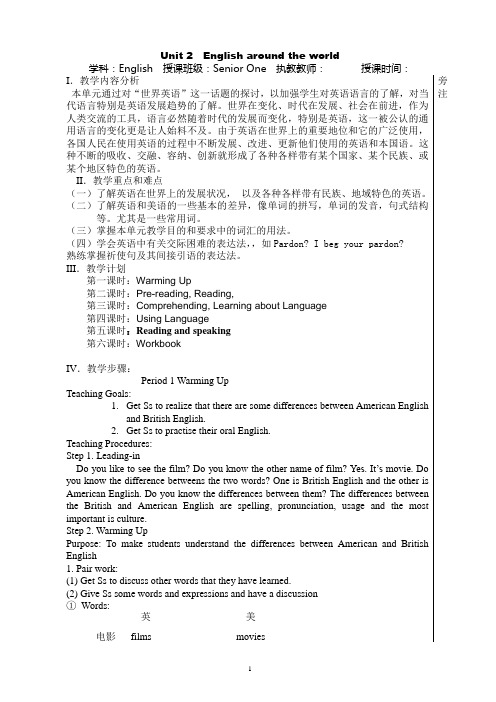
Unit 2 English around the world学科:English 授课班级:Senior One 执教教师:授课时间:I.教学内容分析本单元通过对“世界英语”这一话题的探讨,以加强学生对英语语言的了解,对当代语言特别是英语发展趋势的了解。
世界在变化、时代在发展、社会在前进,作为人类交流的工具,语言必然随着时代的发展而变化,特别是英语,这一被公认的通用语言的变化更是让人始料不及。
由于英语在世界上的重要地位和它的广泛使用,各国人民在使用英语的过程中不断发展、改进、更新他们使用的英语和本国语。
这种不断的吸收、交融、容纳、创新就形成了各种各样带有某个国家、某个民族、或某个地区特色的英语。
II.教学重点和难点(一)了解英语在世界上的发展状况,以及各种各样带有民族、地域特色的英语。
(二)了解英语和美语的一些基本的差异,像单词的拼写,单词的发音,句式结构等。
尤其是一些常用词。
(三)掌握本单元教学目的和要求中的词汇的用法。
(四)学会英语中有关交际困难的表达法,,如Pardon? I beg your pardon?熟练掌握祈使句及其间接引语的表达法。
III.教学计划第一课时:Warming Up第二课时:Pre-reading, Reading,第三课时:Comprehending, Learning about Language第四课时:Using Language第五课时:Reading and speaking第六课时:WorkbookIV.教学步骤:Period 1 Warming UpTeaching Goals:1.Get Ss to realize that there are some differences between American Englishand British English.2.Get Ss to practise their oral English.Teaching Procedures:Step 1. Leading-inDo you like to see the film? Do you know the other name of film? Yes. It’s movie. Do you know the difference betweens the two words? One is British English and the other is American English. Do you know the differences between them? The differences between the British and American English are spelling, pronunciation, usage and the most important is culture.Step 2. Warming UpPurpose: To make students understand the differences between American and British English1. Pair work:(1) Get Ss to discuss other words that they have learned.(2) Give Ss some words and expressions and have a discussion①Words:英美电影films movies 旁注汽油petrol gas, gasoline图钉drawing thumb tack钞票banknote bill跳远long jump broad jump糖果sweets candy(1)Divide Ss into groups and ask them to make a dialogue.(2)Let Ss practice the dialogue with their partners.Periods 2 Pre-reading and ReadingTeaching Goals:1.Get Ss to learn about English spoken around the world2.Improve Ss’ reading ability, especially the skills of summarizing, word guessing andscanning.3.Get Ss to realize the importance of learning English and of love of our own country.4.Encourage Ss to think and talk in English through communicative tasks and provideSs with chances of cooperation.Teaching Procedures:Step 1. Leading-inPresent Ss with the names of seven countries (the UK, the USA, Canada, Australia, South Africa, Ireland and New Zealand), and ask S s: “Is there any relationship b etween these 7 countries?” Allow Ss to show their own opinions. The answer is that English is the mother tongue to the people in these 7 countries.1.Present Ss with the names of some other countries: India, Pakistan, Nigeria and thePhilippines. Then ask: “Is English spoken in these countries?” Allow Ss to show their own opinions. English is used as an official language in these countries, which is spoken on formal occasions like governing, schooling and news reporting.2.Also in many countries, English is learned as a foreign language, like in China, Japan,France and so on. So although English doesn’t have the most speakers in the world, it is the most popular language all over the world. Today we’re going to read a lesson entitled English around the world.Step 2. Reading1.Skimming:Get Ss to read through the passage and find the topic sentence of each paragraph.Para 1 Today, more people speak English as their first, second or foreign language than ever before.Para 2 Native English speakers can understand each other even if they don’t speak the same kind of English.Para 3 All languages change when cultures communicate with one another.Para 4 English is also spoken as a foreign or second language in South Asia.2. ScanningPurpose: To get Ss to have some details in the text.Read the text quickly and try to get some details from the text. Work in pairs and try to ask and answer questions from the text. Questions can be like these.Q1. How many people spoke English at the end of the 16th century? Where did they live?Q2. Why is English to be spoken in many other countries in the next century?Q3. Which country has the largest number of English speakers?Q4. Why has English changed over time?Q5. Why does India have a very large number of English speakers?Suggested answers:A1. At the end of the 16th century, about five to seven million people spoke English.A2. In the next century, people from England started moving to other parts of the world,so English began to be spoken in many other countries.A3. China may have the largest number of English speakers.A4.Because all languages change when cultures communicate with one another.A5.India has a very large number of English speakers. This is because Britain ruled India from 1765 to 1947.3.Careful reading:Get Ss to read the passage carefully again and meanwhile try to guess the meaning of the following words or phrases: even if, come up, actually, play a role, vocabulary, usage, identity , government.even if=even though: in spite of the fact; no matter whetherplay a role: to be involved in an activityactually: really; in factvocabulary: all the words and phrases you learnsuch as: for exampleelevator: a machine used for moving people or things up and down4.After reading:Allow Ss to discuss with their partners the meaning of the new words. Then let some Ss explain the words. The teacher can give some further explanations if necessary.5.Answer these questions.(1) Do you think what kind of English you learn matters? Why?(2) Why do you think people all over the world want to learn English?(3) Give Ss chances to ask each other questions on the passage.6. Read the passage and choose the correct answer⑴English has /had the most speakers _______.A. now B, when the British ruled many parts of the worldC. in the time of ShakespeareD. in the 12th century .⑵Which of the following sentence is true?A Language always stay the same B. Language change only after warsC .Language no longer changeD .Language change when cultures change⑶From AD450 to 1150,English sounded more like ______.A . French B. ChineseC. GermanD. Russian⑷Shakepeare’s English was spoken around_______.A. 1400’sB. 1150’sC .450’s D. 1600’s⑸Which country has the fastest growing number of English speakers in the world ?A. Australia B ChinaC. IndiaD. BritainSuggested Answers: (1) A (2) D (3) C (4) D (5) BStep 3. Discussion1.After reading the passage, we’ve learned so much about English spoken around theworld. Do you think it’s necessary to have a good knowledge of English? Why do you think so? Please form groups of four and discuss these questions with your partners.(The teacher should walk around to provide any necessary help.)2.Give the students chances to express their opinions freely.3.Summary by the teacher:Through learning this passage, we have got to know that English is becoming more and more popular all over the world now. So English learning seems important to everyone, especially us students of the new century. With China’s entry into WTO, English will play a more important part in business, in tourism, and even in people’s daily life. So it’s no doubt that everyone should have a good knowledge of English. And I hope every one in our class can make an effort to learn English well. But on the other hand, it does n’t mean English is better than Chinese just as some students said just now. We must keep it in mind that one’s mother tongue is the most beautiful language in the world. The reason why we learn English is that we should thus be more capable of building up our country(It’s a good chance to lead the students to love our own country as well as to learn English well.)Step 4. Words and expressions1. Native English speakers can understand each other even if they do n’t speak the same kind of English .以英语作为母语的人,即使他们讲的英语不尽相同,也可以相互交流。
(人教版)高中英语必修一Unit 2 English around the world 学案(含答案)
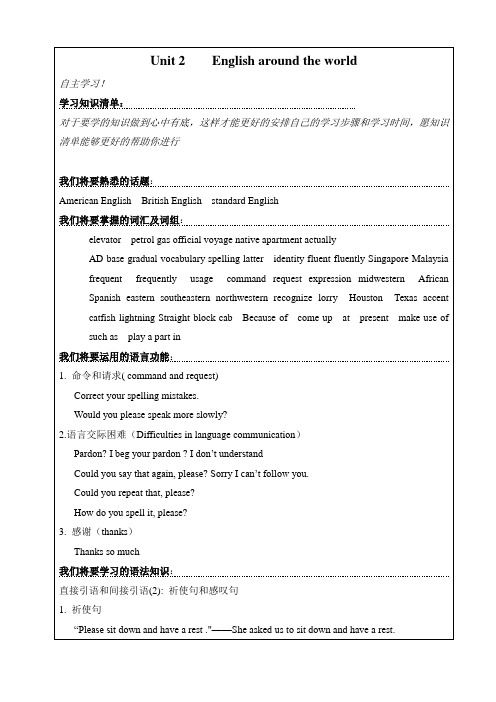
人教版高一英语必修1 Unit2 Engpsh around the world 学案含答案

Unit2 English around the world(Module 1)Period 1 Reading: The Road to Modern English班级__________ 姓名____________ 学号_____________ Learning Objectives:1.Learn the useful new words and expressions.2.Read the passage and learn about the development of English.3.Learn the reading sub-skills-- scanning and skimmingLearning Key Points:Learn reading skills: scanning and skimmingLearning Difficult Points:Improve the reading ability.Learning Procedures:I.【Pre-class homework】A:Tell the sentences True or False1.English had the most speakers in the 17th century.2.English developed when new settlers and rulers came to Britain.nguages frequently change.4. The language of the government is always the language of the country.5. English is one of the official languages used in India.6. This reading describes the development of the English language.B:fill in the form according to text.AD450--1150 English was based on ____1_______At the end of the 16th century How many people speak English?_______2___Shakespeare made use of a wider vocabulary. ______3____Some British settlers moved to America._______4____English began to be spoken in _______5___ Later in the 18th centuryThe language was settled._____________6___II.【While-class】Step 1 Lead-inStep 2 Group discussionSs discuss their pre-class homework in group.Step 3 Practice:A:Choose the correct answer1.English has/had the most speakers___.A.NowB. when the British ruled many parts of the worldC. in the time of ShakespeareD. in the 12th century2.Which of the following statement is true?A. Languages always stay the sameB. Languages change only after warsC. Languages no longer changeD. Languages change when cultures change3. Why was Shakespeare able to make use of a wider vocabulary by the 1600s?A. Because new settlers enriched English and especially its vocabulary.B.Because Shakespeare made up many new words.C. British settlers moved to different countries.D.A new dictionary was written.4.What happened to American English in the 19th century?A.It became more like British EnglishB. It became more like German.C.It had its own dictionary.D.Its spelling was given a separate identity.5.Which of the following is NOT true?A.English is one of the official language in India.B.English developed when new settlers and rulers came to Britain.C.China has the largest number of English speakers.D.Now more people speak English as their first , second or a foreign language.B. Fill in the blank with proper wordsEnglish has changed and developed 1.________cultures meet and communicate with each other.2.________AD 450 to 1150 , new settlers to English 3._______(rich) the English language and enlarged its vocabulary. In 1620, British people began to move to other countries, and 4.______________ (gradual ), English was spoken in many other countries. By the 19th century American English spelling got a separate 5._______________when Noah Webster wrote his dictionary. At 6___________, more people speak English as their first , 7_________ or a foreign language than ever before. People in South Asia 8__________ as India, Singapore speak 9______________ English.China may have the 10________________ number of English learners.Step4 PresentationStep5 SummaryIII.【Post-class】Self- reflectionI enjoyed learning about:I found these words useful:I found these expressions useful:I have learned about:Some examples:Suggested answers:Ⅰ.课前预习A: FTFFTTB: 1.German 2. 5-7million 3.By the 1600’s 4. In 1620 5. Australia 6. By the 19th centuryII.课堂检测:A:1. A 2. D 3. A 4. D 5. CB:1.when 2. From 3. enriched 4. gradually 5. identity6. present7. second8. such9. fluent 10. largestPeriod 2 Language focus in Reading班级__________ 姓名____________ 学号_____________Learning Objectives:1. Learn and grasp the important useful new words and expressions.2. Learn the important useful sentences and patterns.3. Make sentences after the useful expressions.Learning Key points:Enable Ss to grasp the usages of such important new words and expressions.Learning Difficult Points:Get Ss to understand some difficult and long sentences.Learning Procedures:I.【Pre-class homework】(课堂前置性作业) :Make sentences using the followingwords and phrases:1.actually2.base3. because of4. come up5. at present6. make use of7.such asII.【While-class】Step 1 Lead-inStep 2 Group discussionSs discuss their pre-class homework in group.Step 3句子仿写1.Today, more people speak English as their first, second or a foreign languagethan ever before.汉译英:________________________________________________________仿写:中国比以往任何时候都更加富有强大。
人教版高中英语必修一 学案设计:Unit 2 English around the world2.1
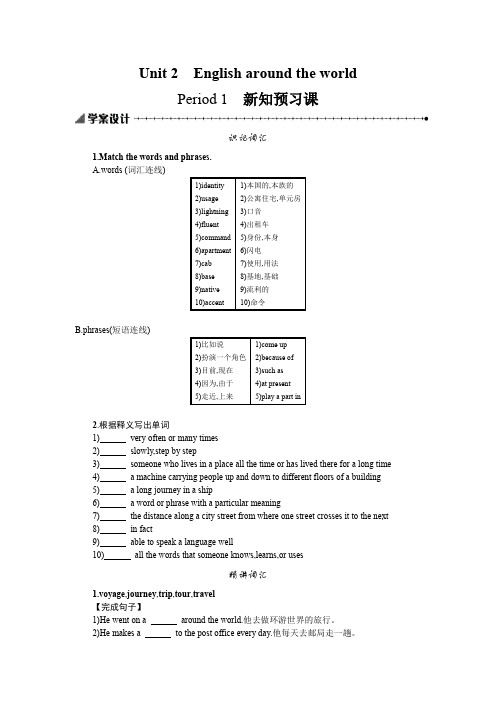
Unit 2English around the worldPeriod 1新知预习课识记词汇1.Match the words and phrases.A.words (词汇连线)1)identity2)usage3)lightning4)fluent5)command6)apartment7)cab8)base9)native10)accent 1)本国的,本族的2)公寓住宅,单元房3)口音4)出租车5)身份,本身6)闪电7)使用,用法8)基地,基础9)流利的10)命令B.phrases(短语连线)1)比如说2)扮演一个角色3)目前,现在4)因为,由于5)走近,上来1)come up2)because of3)such as4)at present5)play a part in2.根据释义写出单词1)very often or many times2)slowly,step by step3)someone who lives in a place all the time or has lived there for a long time4) a machine carrying people up and down to different floors of a building5) a long journey in a ship6) a word or phrase with a particular meaning7)the distance along a city street from where one street crosses it to the next8)in fact9)able to speak a language well10)all the words that someone knows,learns,or uses精讲词汇1.voyage,journey,trip,tour,travel【完成句子】1)He went on a around the world.他去做环游世界的旅行。
人教版高中英语必修一教案Unit 2 English around the world (含答案)
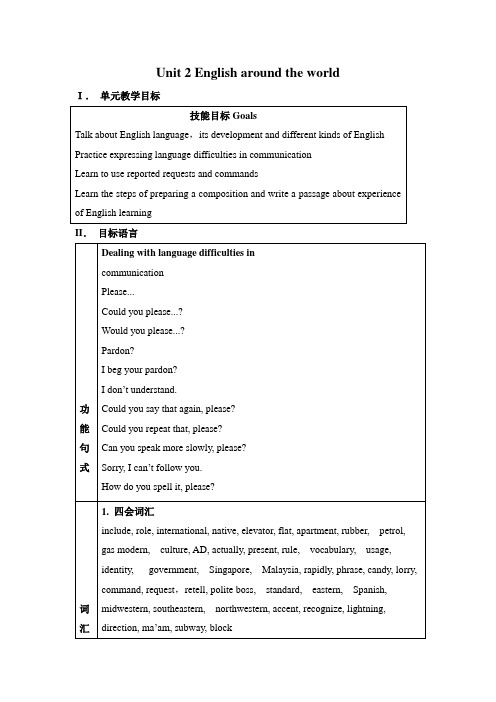
Unit 2 English around the world I.单元教学目标II.目标语言III. 教材分析与教材重组1. 教材分析本单元以“世界英语”为中心话题,旨在通过本单元的学习让学生粗略了解世界英语的发展状况,认识各种各样具有民族,地域特色的英语以及它们的出现原因和不同之处。
同时让学生学会语言障碍的表达法,能够区分、转述命令或请求语气的祈使句,并让学生能用所学构思方法写一篇关于英语学习经验的作文。
1.1 Warming Up 介绍世界英语,要求学生区分英美语单词。
此部分的目的是丰富学生有关世界英语的知识。
激发学生对英语发展历史的兴趣。
1.2 Per-reading部分设置了两个与主题相关的问题。
在激活学生已有知识的同时引导学生为下一步阅读做好准备。
1.3 Reading是一篇介绍英语发展史的文章。
文章首先以英语在分布范围上的扩展来陈述英语的发展。
第二段提出英语已发展为多个分支,并举例说明。
第三,四段以时间为顺序,描述英语在不同时期与不同文化的交融,说明世界英语的形成原因,并对中国英语提出设想。
1.4 Comprehending 设计了两个习题。
第一部分以选择题的形式检测学生对课文的理解。
第二部分设置了两个开放性思考问题。
引导学生在掌握课文的基础上联系实际,对英语学习现状陈述自己的观点。
培养学生的思辨能力。
1.5 Learning about Language分词汇和语法两个部分。
词汇部分设置连线、填空等形式的习题,在运用让中学生巩固所学单词及词组,体会英美语言差异。
第二部分讲解了本单元的语法项目(1)学会区分、感悟“命令”与“请求”的语言结构和语气;(2)学习转述他人的“请求”和“命令”的间接引语。
同时给出直接引语和间接引语的用法训练,包括单句的练习和情景语法练习。
培养学生的转述能力。
1.6 Using Language包括四个部分。
以语言实践为目的。
(1) Reading and talking 是一篇阅读材料介绍了英语方言。
人教版高中英语必修一精品导学案:Unit2Englisharoundtheworld新人教版必修1
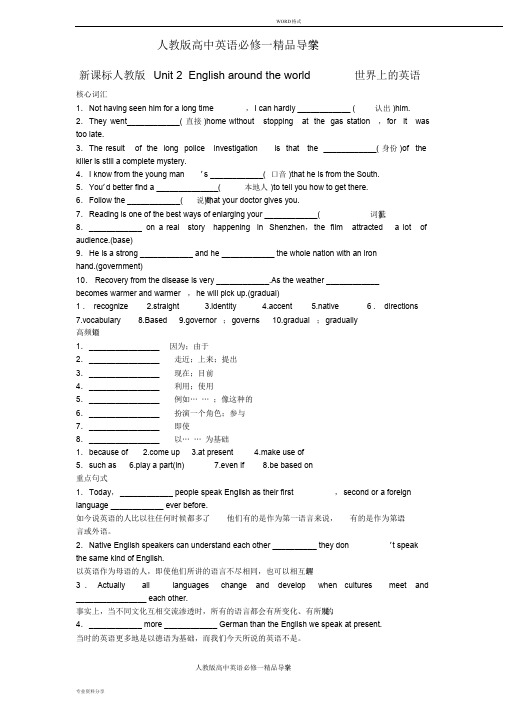
新课标人教版Unit 2 English around the world 世界上的英语核心词汇1.Not having seen him for a long time ,I can hardly ____________ ( 认出)him. 2.They went____________( 直接)home without stopping at the gas station ,for it was too late.3.The result of the long police investigation is that the ____________( 身份)of the killer is still a complete mystery.4.I know from the young man ’s ____________( 口音)that he is from the South.5.You’d better find a ______________( 本地人)to tell you how to get there.6.Follow the ____________( 说明)that your doctor gives you.7.Reading is one of the best ways of enlarging your ____________( 词汇量) .8.____________ on a real story happening in Shenzhen,the film attracted a lot of audience.(base)9.He is a strong ____________ and he ____________ the whole nation with an ironhand.(government)10.Recovery from the disease is very ____________.As the weather ____________becomes warmer and warmer ,he will pick up.(gradual)1 .recognize 2.straight 3.identity 4.accent 5.native 6 .directions 7.vocabulary 8.Based ernor ;governs 10.gradual ;gradually语高频短1.________________ 因为;由于2.________________ 走近;上来;提出3.________________ 现在;目前4.________________ 利用;使用5.________________ 例如⋯⋯;像这种的6.________________ 扮演一个角色;参与7.________________ 即使8.________________ 以⋯⋯为基础1.because of e up 3.at present 4.make use of5.such as 6.play a part(in) 7.even if 8.be based on重点句式1.Today,____________ people speak English as their first ,second or a foreign language ____________ ever before.语如今说英语的人比以往任何时候都多了,他们有的是作为第一语言来说,有的是作为第二言或外语。
人教版高中英语必修1 Unit 2 English Around the World 学案设计

Unit 2 English around the world【学习目标】掌握本单元的常用词汇表达。
【学习重难点】熟练记住常用词汇与词组。
【学习方法】速读、细读、归纳、练习【学习内容】一、重点词汇mand n.[C]命令,指令;[U]掌握vt. 命令;指挥,支配;博得,赢得Can you find the following command and request from Reading?你能从阅读中找出下面的命令和要求吗?[归纳拓展](1) at sb.'s command听某人的支配in command of指挥;控制under one's command由……指挥take command of控制;担任……的指挥have a good command of很好地掌握,精通(2) command sb.to do sth.命令某人做某事command that...(should)do...命令……做……[例句探源]①The police arrived and took command of the situation.警察到达后就控制了局势。
②Applicants will be expected to have a good command of computer skills.申请人必须有很好的电脑技能。
③The general commanded that we attack at once.将军下令我们立刻发起进攻。
[即境活用]1.In order to have a good________ of English,he resigned and went abroad.A.command B.needC.master D.direction解析:选A。
句意:为了很好地掌握英语,他辞了职到国外去了。
have a good command of 表示“很好地掌握”的意思。
高一上人教版英语必修1学案Unit2 English around the world学案知识点练习学案2
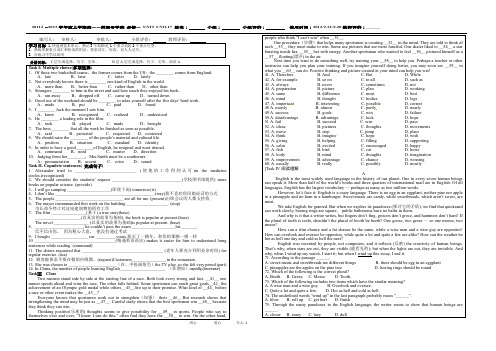
12.顾客被要求不要在餐馆内吸烟。(request)Customers________________in the restaurant.
2.We should consider the students’ request ________________________________(学校图书馆提供) more books on popular science. (peovide)
3.I will go camping ____________________(即使下雨) tomorrow.(it)
9.In order to have a good________of English, he resigned and went abroad.
A.command B.need C.masterD.direction
10.Judging from her________,Mrs.Smith must be a southerner.
信不信由你,因为粗心大意,他没有通过考试
9.I bought _________________ car _________ yours.我买了一辆车,和你的那辆一模一样
10 _____________________________________(精通英语语法) makes it easier for him to understand lomg sentences while reading. (command)
4.I don’t like _____________________________________________.(way)我不喜欢你同她说话的方式
高一上人教版英语必修1学案Unit2 English around the world阅读理解训练学案

Reading Practise编写人:审核人:审批人:1 通过阅读,准确把握文章主旨,提升理解能力。
2激情阅读,合作探究,大胆质疑使用说明与学法指导方法导引: 阅读根据原文选择正确答案,培养快速寻找答案能力。
养成带着问题找答案的习惯。
分层目标:C层完成Reading A ,B , C and D。
A层完成Reading A, B ,C, Dand E 。
AAmer ican middle school students don’t seem to care that they’re worse at maths than their counterparts (同龄人) in China’s Hong Kong and Finland. “I don’t need it,” my student says, “I’m going to be a basketball star.” Or a car mechanic, or a singer.Middle schoo l students’ maths skills were tested by the International Organization for Economic Co-operation and Development. The United States ranked 28th out of 41 countries tested. After all, when was the last time you used algebra (代数)?But maths isn’t just about training Americans to become scientists. It has its own value. It helps you see patterns and develops your logic skills, and it teaches you to concentrate and to separate truth from falsehood. Maths helps you make wise financial decisions, so you can avoid false claims from advertisers, politicians and others. It helps you determine risk. For example, after an airplane crash, studies show that people are more likely to drive than to take a plane in spite of the fact that they are much more likely to be killed or injured while driving. Planes are not like criminals who repeat the same crime over and over. One plane is not more likely to crash just because another plane recently did. In fact, the most dangerous time to drive is probably right after a plane crash because so many people are on the road.It is not possible to really understand science and the scientific method without understanding maths. A rainbow is even more beautiful and amazing when we understand it.The precision (精确性) of maths helps us think in a very special way. How do we bring the learning of maths back to life? I don’t have the big answer. I try my best to help pupils find answers to some maths problems. When I can get one to say, “Wow, that’s great,” I feel th e joy of a small victory.61. Some American students don’t care about their poor maths results because __________.A. maths is useless to most peopleB. they have no interest in mathsC. they think maths has nothing to do with their futureD. t hey don’t do well in maths62. The example in Paragraph 3 is used to show __________.A. every coin has its two sidesB. we should not be cheated by fault factsC. maths is close to our daily lifeD. a simple fact shows complicated rules63. The writer would agree that __________.A. it’s normal that America kids are weak in mathsB. without maths we’ll miss much in our lifeC. maths is the most important subject at schoolD. American kids don’t work hard at school64. This text is most probably written by __________.A. a student career guideB. a researcher on students’ problemsC. a specialist in students’ studiesD. a maths teacherBToo many people want others to be their friends, but they don’t give friendship back. That is why some friendships do not last very long. To have a friend, you must learn to be one. You must learn to treat your friend the way you want your friend treat you. Learning to be a good friend means learning three rules. Be honest; be generous; be understanding.Honesty is where a good friendship starts. Friends must be able to trust one another. If you do not tell the truth, people usually find out. If a friend finds out that you haven’t been honest you may lose your friends’ trust. Good friends always count on one another to speak and act honestly.Generosity means sharing and sharing makes a friendship grow. You do not have to give your lunch money on your clothes of course. Instead you have to learn how to share things you enjoy, like your hobbies and your interest. Naturally you will want to share your ideas and feelings. These can be very valuable to a friend. They tell your friend what is important to you. By sharing them you help your friend know yo u better.Sooner or later every one needs understanding and help with a problem. Something may go wrong at school. Talking about the problem can make it easier to solve. Turning to a friend can be a first step in solving the problem. So to be a friend you must listen and understand. You must try to put yourself in your friend’s place so you can understand the problem better.No two friendships are ever exactly alike. But all true friendships have three things in common. If you plan to keep your friends, you must practise honesty, generosity, and understanding.65. Some friendships don’t last very long because ____.A. there are too many people who want to make friends.B. those who never give others friendships receive no friendship from others.C. those who give others friendship receive friendship from others.D. they don’t know friendship is something serious.66. According to the passage honesty is _____.A. something goodB. the base of friendshipC. as important as moneyD. more important than anything else67. The underlined word “generosity” means ___.A.大度B.节约C.吝啬D.和气68. Which of the following isn’t mentioned (提及)in the passage?A. Always tell your friend the truth.B. Sharing your mind with your friend is of great value.C. Discussing your problems with your friend often helps to solve the problem.D. A friend who gives you his lunch money is a true friend.CHere are a few tips we’ve put together to help you learn English well.Speak, speak, speakPractise speaking as often as you can—even speaking to yourself is good practice.Try recording yourself whenever you can. Compare your pronunciation with the master version, see how you can do better and have another go. If you do this several times, you will find that each version is better than the last.Why not learn with someone else?It helps if you can l earn with someone else. If you can persuade a friend or a family member to study with you, it will make you keep working.Don’t get stuck by a word you don’t know.Practise improvising(即兴的)ways of getting your meaning across when speaking spontaneously(本能地), even if you don’t know the exact words or phrases. Thi nk of things you might want to say whenever you have spare time. Use facial expressions, hand movements, anything to get your meaning across.Language learning is also about intuition(直觉).Guesswork is an important way to learn a new language. When listening to recorded material, you aren’t expected to understand everything first round. If you play the same piece several times, y ou will most probably understand something new each time.Build up your vocabulary.A wide vocabulary is the key to successful language learning but don’t try to learn too much at once. It’s best to study frequently, for short periods of time. Take at most six or seven items of vocabulary and learn them. Put them into sentences to fix them in your mind, then come back to them later.And above all, have fun!69. Why should one have himself recorded when practicing speaking?A. To improve his speaking.B. To record his own progress.C. To encourage others to start.D. To compare himself with others.70. In the writer’s opinion, which of the following is the most important in leaning English?A. Speaking.B. Pleasure.C. Intuition.D. V ocabulary.71. It is implied in the passage that _______ is helpful when you are learning English.A. body languageB. a good materialC. a good friendD. a proper dictionary72. According to the passage, one should ______ when you are learning English.A. always work with other peopleB. be able to guess everything newC. often review what he has learntD. take little notice of grammarDParents should stop blaming themselves because there’s not a lot they can do about it. I mean the teenager problem. Whatever you do or however you choose to deal with it, at certain times a wonderful, reasonable and helpful child will turn into a terrible animal.I’ve seen friends deal with it in all kinds of different ways. One strict mother insisted that her son, right from a child, should stand up whenever anyone entered the room, open doors and shake hands like a gentleman. I saw him last week when I called round. Sprawling himself (懒散地躺) on the sofa in full length, he made no attempt to turn off the loud TV he was watching as I walked in, and his greeting was no more than a quick glance at me. His mother was ashamed. “I don't know what to do with him these days,” she said. “He’s forgotten all the manners we taught him.”He hasn’t forgotten them. He’s just decided that he’s not going to use them. She confessed (坦白) that she would like to come up behind him and throw him down from the sofa onto the floor.Another good friend of mine let her two daughters climb all over the furniture, reach across the table, stare at me and say, “I don’t like your dress; it’s ugly.” One of the daughters has recently been driven out of school. The other has left home.“Where did we go wrong?” her parents are now very sad. Probably nowhere much. At least, no more than the rest of that unfortunate race, parents.73. This text is most probably written by ______.A. a specialist(专家)in teenager studiesB. a headmaster of a middle schoolC. a parent with teenage childrenD. a doctor for mental health problems74. The underlined word “it” in the second paragraph refers to ______.A. the change from good to bad that’s seen in a childB. the way that parents often blame themselvesC. the opinion that a child has of his parentsD. the advice that parents want their children to follow75. From the second example we can infer that the parents of the two daughters __.A. pay no attention to themB. are too busy to look after themC. have come to hate themD. feel helpless to do much about them76. What is the author’s opinion about the sudden change in teenage children?A. Parents have no choice but to try to accept it.B. Parents should pay still some attention to the change.C. Parents should work more closely with school teachers.D. Parents are at fault for the change in their children.EDo dogs understand us?Be careful what you say around your dog. It might understand more than you think.A border collie named Rico recognizes the names of about 200 objects, say researchers in Germany. The dog also appears to be able to learn new words as easily as a 3-year-old child. Its word-learning skills are as good as those of a parrot or chimpanzee.In one experiment, the researchers took all 200 items that Rico is supposed to know and divided them into 20 groups of 10 objects. Then the owner told the dog to go and fetch one of the items and bring it back. In four tests, Rico got 37 out of 40 commands right. As the dog couldn't see anyone to get clues, the scientists believe Rico must understand the meanings of certain words.In another experiment, the scientists took one toy that Rico had never seen before and put it in a room with seven toys whose names the dog already knew. The owner then told Rico to fetch the object, using a word the dog had never heard before.The correct object was chosen in seven out of ten tests, suggesting that the dog had workedout the answer by process of elimination(排除法). A month later, Rico remembered half of the new names, which is even more impressive.Rico is thought to be smarter than the average dog. For one thing, Rico is a border collie, a breed (品种)known for its m ental abilities. In addition, the 9-year-old dog has been trained to fetch toys by their names since the age of nine months.It's hard to know if all dogs understand at least some of the words we say. Even if they do, they can't talk back. Still, it wouldn't hurt to sweet-talk your dog every now and then. You might just get a big, wet kiss in return!77. From paragraph 2 we know that __ .A. animals are as clever as human beingsB. chimpanzees have very good word-learning skillsC. dogs are smarter than parrots and chimpanzeesD. dogs have similar learning abilities as 3-year-old children78. Both experiments show that .A. Rico is smart enough to get all commands rightB. Rico can recognize different things including toysC. Rico has developed the ability of learning mathematicsD. Rico won't forget the names of objects once recognizing them79. Which of the following statements is true?A. Rico has a better memory partly because of its proper early training.B. The purpose of the experiments is to show the border collie's mental abilities.C. The border collie is world-famous for recognizing objects.D. Rico is born to understand its owner's commands.80. What does the writer want to tell us?A. To train your dog.B. To talk to your dog.C. To be careful with your dog.D. To be friendly to your dog.。
高一上人教版英语必修1学案Unit2Englisharoundtheworld学案语言运用导学案
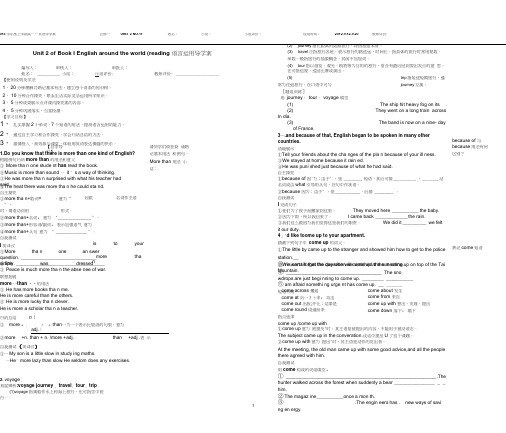
Unit 2 of Book I English around the world (reading 语言运用导学案编写人:审核人:审批人:姓名:___________ 小组:斥组评价: 教师评价: _____________________ 【使用说明及学法1、20分钟理解并熟记基本有法,建立每个词条的知识树。
2、10分钟合作探究,联系生活实际灵活运用所学知识。
3、5分钟成果展示点评课内探究案的内容。
4、5分钟巩固落实、当堂检测。
【学习目标】1、扎实掌握2个单词、7个短语的用法,提高语言运用的能力。
2、通过自主学习和合作探究,学会归纳总结的方法。
3、激情投入,高效参与课堂,体验用英语表达情感的快乐。
【自学导引】1.Do you know that there is more than one kind of English?根据例句归纳more than的用法和意义① More tha n one stude nt has read the book.②Music is more than sound —it ' s a way of thinking.③He was more tha n surprised with what his teacher had said. ④The heat there was more tha n he could sta nd. 自主探究①more tha n+数词= ,意为“”,时,谓语动词用形式。
②more than+名词,意为“________________ ”。
③more than+形容词/副词,表示加强语气意为④more than+从句意为“ _______________ ”。
自我测试I英译汉①More tha n one an swer question. ____________________________ ②S he was dressed后跟名词作主语is to yourmore than simply. _________________________________③ Peace is much more tha n the abse nee of war.联想拓展more …than ••的用法① He has more books tha n me.He is more careful than the others.② He is more lucky tha n clever.He is more a scholar tha n a teacher.归纳总结n i①more + , ;+ than…为一个表示比较级的句型,意为adj. I②more +n. than + n. /more +adj. than +adj .表示自我测试(英译汉)①一My son is a little slow in study ing maths.—He' more lazy than slow.He seldom does any exercises.2. voyage,易混辨析:voyage journey , travel, tour, trip(1)voyage指乘船作水上和海上旅行,也可指空中旅行。
高一上人教版英语必修1学案Unit2 English around the world学案语法导学案

必修Book 1 Unit 2 English around the world 语法导学案编写人:审核人:审批人:【学习目标】1、理解并掌握直接引语和间接引语用法。
2、运用直接引语和间接引语完成句子。
3、用饱满的激情疯狂记忆,挑战自我,积极展示,享受学习的快乐。
【使用说明及学法指导】仔细阅读语法细则,用红笔标出重点AB层完成所有认为,C层选当堂检测部分。
直接引语和间接引语(Ⅱ)语法规则(祈使句改为间接引语)1.根据祈使句的语气,如果是强制性的,如军官、警官对下级,老板对雇员等,把say改为order或demand;如是同级之间一般性的语气,则改为tell;如遇客气的请求,则改为ask,但时态均不变。
2.把祈使的对象放在order,demand,tell,ask后面,作其宾语。
3.把祈使句的动词原形改为不定式to do 或not to do,放在宾语后面,并去掉引号。
4. 如祈使句中有代词,要视具体情况作相应的变化,如your→his/her,this→that,总的原则是使所指不变。
5.祈使句改为间接引语后,成了一个简单句子,整个句子结构为:主语+order/demand/tell/ask+sb.+to do/not to do sth.。
“Take off your boots!”the guard said to Hill.→The guard ordered Hill to take off his boots.Mrs.Black said to the students angrily,“Don’t make any noise!”→Mrs.Black ordered the students not to make any noise.Father said to me,“Look after your little sister.”→Father told me to look after my little sister.“Please help me carry this box,”she said to John.→She asked John to help her 扎实记住这些规律,然后用这些规律解答实际题目扎实记住这些规律,然后用这些规律解答实际题目carry that box.【拓展】直接引语若为祈使句(通常表示命令、要求、建议等),变为间接引语时,常构成简单句型“引述动词ask/tell/order/advise/warn/remind/etc.+名(代)词宾语+(not)不定式”。
- 1、下载文档前请自行甄别文档内容的完整性,平台不提供额外的编辑、内容补充、找答案等附加服务。
- 2、"仅部分预览"的文档,不可在线预览部分如存在完整性等问题,可反馈申请退款(可完整预览的文档不适用该条件!)。
- 3、如文档侵犯您的权益,请联系客服反馈,我们会尽快为您处理(人工客服工作时间:9:00-18:30)。
Unit 2 of Book I English around the world (reading)语言运用导学案编写人: 审核人: 审批人:姓名: 小组: 小组评价: 教师评价: 【使用说明及学法指导】1、20分钟理解并熟记基本有法,建立每个词条的知识树。
2、10分钟合作探究,联系生活实际灵活运用所学知识。
3、5分钟成果展示点评课内探究案的内容。
4、5分钟巩固落实、当堂检测。
【学习目标】1、扎实掌握2个单词、7个短语的用法,提高语言运用的能力。
2、通过自主学习和合作探究,学会归纳总结的方法。
3、激情投入,高效参与课堂,体验用英语表达情感的快乐。
【自学导引】 1.Do you know that there is more than one kind of English? 根据例句归纳more than 的用法和意义 ①More than one student has read the book. ②Music is more than sound —it’s a way of thinking.③He was more than surprised with what his teacher had said.④The heat there was more than he could stand.自主探究①more than+数词= ,意为“ ”, 后跟 名词作主语时,谓语动词用 形式。
②more than+名词,意为“ ”。
③more than+形容词/副词, 表示加强语气,意为“ ”。 ④more than+从句 意为“ __ ”。
自我测试 I 英译汉①More than one answer is to yourquestion.______________________________②She was dressed more than simply.__________________________________③Peace is much more than the absence of war. 联想拓展 more …than…的用法 ① He has more books than me. He is more careful than the others.②He is more lucky than clever.He is more a scholar than a teacher.归纳总结 ① more +⎩⎨⎧⎭⎬⎫n .adj .+than… 为一个表示比较级的句型,意为“ ”。
②more +n. than + n. /more +adj. than +adj .表示“ ” 自我测试(英译汉) ①—My son is a little slow in studying maths.—He’s more lazy than slow.He seldom does any exercises.________________________________________________________________________2. voyage ,易混辨析:voyage journey ,travel ,tour ,trip(1)voyage 指乘船作水上和海上旅行,也可指空中旅行。
请同学们疯狂背诵熟记基本用法和例句。
More than 用法小结:(2)journey 指长距离的陆路旅行,特指旅途本身。
(3)travel 泛指旅行各地,表示旅行的路途远,时间长。
指具体的旅行时常用复数,单数一般指旅行的抽象概念,其前不加冠词。
(4)tour 指以游览、观光、购物等为目的的旅行,常含有最后回到原出发点的意思。
也可指巡视,巡回比赛或演出。
(5)trip 指短途短期旅行,通常为往返旅行。
在口语中可与journey 互换。
[题组训练]用journey ,tour ,voyage 填空(1)The ship hit heavy fog on its .(2)They went on a long train across India. (3)The band is now on a nine-day of France. 3…. and because of that, English began to be spoken in many other countries. 语境展示①Tell your friends about the changes of the plan because of your illness.③We stayed at home because it rained.④He was punished just because of what he had said.自主探究①because of “因为;由于”, 是 短语,其后可接 , 动名词或由what 引导的从句,在句中作状语。
②because “因为;由于”,是 ,后接 。
自我测试 I 完成句子①他们为了孩子而搬家到这里。
They moved here __________ the baby.②因为下雨,所以我回来了。
I came back ____________ the rain.③我们这么做因为我们觉得这是我们的职责。
We did it _________ we felt it our duty.4.I’d like to come up to your apartment.猜测下列句子中come up 的词义。
①The little by came up to the stranger and showed him how to get to the police station.__ ②We won’t forget the day when we watched the sun come up on top of theTai Mountain.③It is certain that the question will come up at the meeting.④The snowdrops are just beginning to come up. _⑤I am afraid something urgent has come up. ____短语归纳 come across 邂逅 come about 发生 come at 向…扑来,攻击 come from 来自 come out 出版;开花;结果是 come up with 想出,发现,提出 come round 绕道而来 come down 落下,塌下指点迷津come up /come up with①come up 意为“被提及”时,其主语是被提出的内容,不能用于被动语态。
The subject came up in the converation.谈话中提到了这个课题。
②come up with 意为“提出”时,其主语是动作的发出者。
At the meeting, the old man came up with some good advice,and all the people there agreed with him. 自我测试 用come 构成的词组填空。
①. The hunter walked across the forest when suddenly a bear ______ _him.②. The magazine __________ once a month.③. The engineers has ___________ new ways of saving energy.because of 与because 用法有何区别? ____________熟记come 短语④. They ___________ an old school friend in the street this morning.5. It was more based on German than……..语境展示①He based his hopes on the good news we had yesterday.②The film is based on a famous novel.③We camped at the base of the mountain.自主探究base,作动词时意为“”,常见结构是base...on/upon...或;作名词时,意为“”。
自我测试①我们应该把自己的观点建立在事实的基础之上。
We should always _____ our opinions ____facts.②这部小说是根据一件真事创作的。
The novel _______ _______ ______ a true story.6....the English we speak at present.语境展示①I am afraid I can’t help y ou at present.②We haven’t found the thief at present.自主探究at present 意为“”。
归纳拓展present adj.目前的,现在的adj.出席的,到场的,在座的(常作表语和后置定语)n.礼物v.[prizent] 呈送,赠送,介绍The mountain bike is a birthday present from my parents.Were you present when the decision was announced?All the students present are against his advice.In the present case, I advise you to wait.May I present my new assistant to you?They presented him with a bunch of flowers.常见短语at present = at the present time目前,现在be present at 出席,到场,参加present sb. with sth.=present sth. to sb. 把。
交给某人;把。
赠与某人自我测试I完成句子①I don’t plan to go on holiday (目前).②大部分到场的科学家表达了他们对当前污染的看法。
Most of the scientists _______________expressed their ideas about thepollution.7. So by the 1600’s Shakespeare was able to make use of a wider vocabulary than ever before.语境展示①We should make good use of our spare time to review,for the final exam is near.②The Internet resources should be made full use of自主探究make use of 意为;make good use of意为;make full use of意为,其中use是名词。
